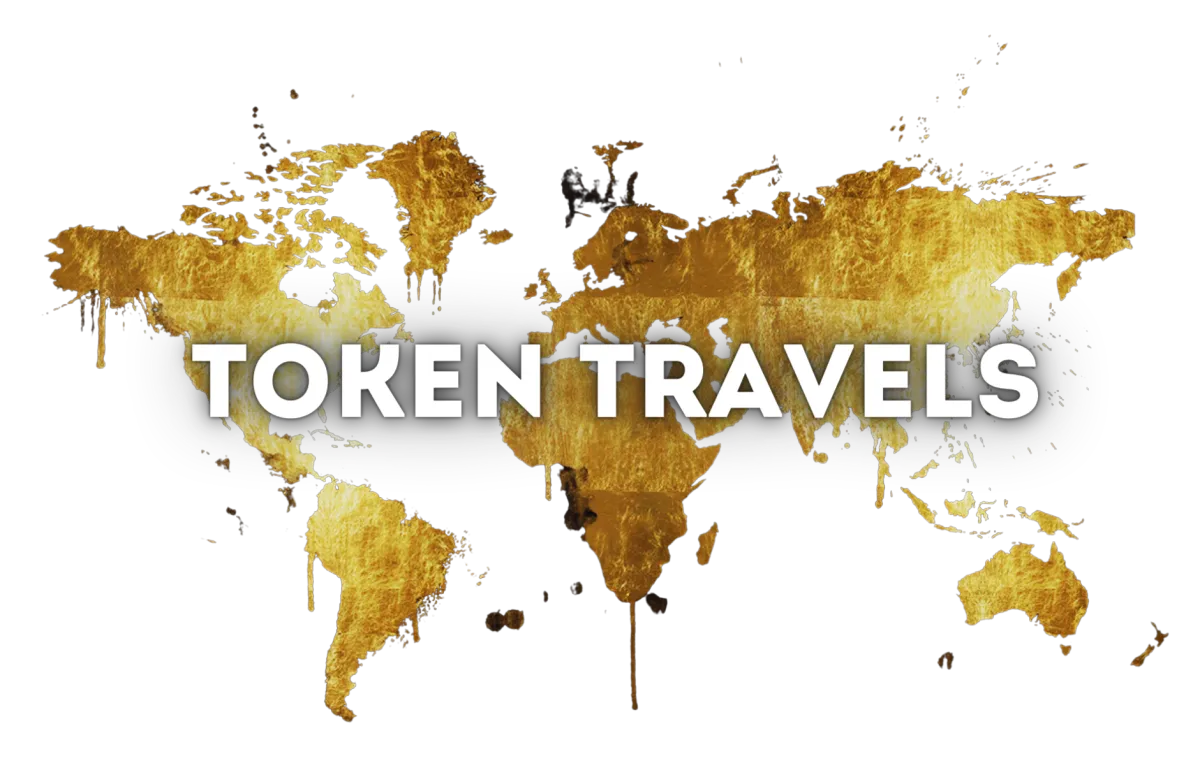
JB Rogers
Founder and Cultural Immersion Specialist
JB founded Token Travels to share his passion for travel and entrepreneurship. Has a passion for exploring new places and helping others achieve their travel dreams.
At Token Travels, we understand the challenges of starting a travel business and the importance of financial freedom. That’s why we provide resources and information on the benefits of starting your own travel business. Our team of travel experts shares their insights on how to start and grow a travel business, including tips on tax benefits, marketing strategies, and financial planning. We also provide support and guidance to help you achieve your business goals. Whether you’re a seasoned entrepreneur or just starting, our business benefits resources will help you achieve financial freedom and succeed in the travel industry. Join us and start your journey to success today!

How to turn a money-maker into a life-changing asset for you and your family.
How to turn a money-maker into a life-changing asset for you and your family.

Are you tired of the daily grind and wish you could escape the rat race? Imagine owning your own travel business and turning it into a life-changing asset for you and your family. With the right strategies and dedication, you can transform a money-making venture into something that brings fulfillment and financial stability.
In this article, we will guide you through the process of starting and growing your own travel business. From finding your niche to marketing your services, we'll cover everything you need to know to create a successful venture that not only generates income but also enhances your quality of life.
Our brand voice is one of encouragement and empowerment. We want to inspire you to take control of your future and build a business that aligns with your passions and goals.
So, if you're ready to embark on a new entrepreneurial journey and live life on your own terms, keep reading. Discover how owning a travel business can unlock exciting opportunities for you and your family, offering a path to financial freedom and personal fulfillment. Get ready to turn your dreams into reality.
Benefits of owning a travel business
Owning a travel business comes with a multitude of benefits that go beyond just financial gain. Let's explore some of the advantages that can make owning your own travel business a life-changing asset.
1. Flexibility and Freedom
One of the most enticing aspects of owning a travel business is the freedom and flexibility it offers. Unlike a traditional 9-to-5 job, you have the power to set your own schedule and work from anywhere in the world. This means you can design a lifestyle that allows you to spend more time with your family and pursue your passions while still earning a living. Whether you want to work from a beachside villa or a cozy coffee shop, the choice is yours.
2. Travel Opportunities
As a travel business owner, you have the incredible opportunity to explore new destinations and experience different cultures. By immersing yourself in the travel industry, you'll gain firsthand knowledge that will not only enhance your personal life but also benefit your business. Traveling allows you to build relationships with suppliers, stay up-to-date with the latest trends, and offer your clients valuable insights and recommendations.
3. Financial Stability
While financial stability is not guaranteed in any business venture, owning a travel business can provide a steady stream of income if managed effectively. The travel industry is a multi-trillion dollar industry that continues to grow, offering numerous opportunities for profit. By establishing yourself as a trusted travel expert, you can attract a loyal client base and generate consistent revenue. With careful planning and strategic marketing, your travel business has the potential to become a reliable source of income for you and your family.
Steps to start your own travel business
Now that you understand the benefits of owning a travel business, let's dive into the steps you need to take to turn your dream into a reality.
1. Conduct Market Research
Before starting any business, it's crucial to conduct thorough market research to identify potential opportunities and assess the level of competition. Start by analyzing the current state of the travel industry, including trends, customer preferences, and emerging markets. This research will help you identify gaps in the market and determine your unique selling proposition (USP) that sets you apart from competitors.
2. Define Your Niche
Next, it's important to define your niche within the travel industry. Instead of trying to cater to everyone, focus on a specific segment of the market that aligns with your interests and expertise. This could be luxury travel, adventure travel, destination weddings, or any other specialized area. By narrowing down your niche, you can become an expert in that particular field and attract clients who are seeking your specific services.
3. Create a Business Plan
A well-crafted business plan is essential for the success of any venture, including a travel business. Your business plan should outline your mission, target market, marketing strategies, financial projections, and growth plans. It serves as a roadmap that helps you stay focused and accountable as you navigate the challenges of starting and growing your business. Be sure to include a comprehensive marketing strategy that outlines how you will attract and retain clients.
Choosing the right niche for your travel business
Finding the right niche for your travel business is a crucial step in building a successful venture. By specializing in a specific area, you can position yourself as an expert and attract clients who are seeking your unique services. Here are some tips to help you choose the right niche for your travel business.
1. Identify your passions and expertise
Start by identifying your passions and areas of expertise within the travel industry. What aspects of travel excite you the most? Are you passionate about adventure travel, luxury vacations, or eco-tourism? By choosing a niche that aligns with your interests, you'll be more motivated and knowledgeable, which will translate into better service for your clients.
2. Research market demand
While it's important to choose a niche that you're passionate about, it's equally important to ensure that there is market demand for your services. Conduct thorough market research to identify if there is a sufficient client base for your chosen niche. Look for trends, customer preferences, and emerging markets that align with your niche. This research will help you assess the potential profitability and sustainability of your chosen niche.
3. Analyze competition
Analyzing the competition is an essential step in choosing the right niche for your travel business. Identify who your competitors are and analyze their strengths and weaknesses. Look for gaps in the market that your business can fill. Consider how you can differentiate yourself from competitors and offer unique value to your clients. This analysis will help you carve out a niche that is not overcrowded and has room for growth.
By carefully considering your passions, market demand, and competition, you can choose a niche that allows your travel business to thrive and stand out in the crowded travel industry.
Building a solid business plan for your travel business
A solid business plan is the foundation of any successful venture, including a travel business. It serves as a roadmap that outlines your goals, strategies, and financial projections. Here are the key components to include in your travel business plan.
1. Executive Summary
The executive summary is a brief overview of your travel business plan. It should highlight the mission and vision of your business, target market, key differentiators, and financial projections. Keep it concise and compelling to grab the reader's attention.
2. Market Analysis
The market analysis section should provide an in-depth understanding of the travel industry and your target market. Include information about industry trends, customer preferences, and potential competitors. Identify the size of your target market and explain how your travel business will meet their needs.
3. Competitive Analysis
In the competitive analysis section, analyze your competitors and identify their strengths and weaknesses. Assess how your travel business will differentiate itself from competitors and offer unique value to your clients. Highlight your USP (unique selling proposition) and explain how it will give you a competitive edge.
4. Marketing and Sales Strategies
Outline your marketing and sales strategies in detail. Explain how you will attract and retain clients, including your online and offline marketing tactics. Include your pricing strategy, customer acquisition channels, and promotional activities. It's important to have a comprehensive marketing plan that aligns with your target market and business goals.
5. Financial Projections
The financial projections section is a crucial part of your travel business plan. It should include your revenue forecasts, expense projections, and projected profits. Be realistic and conservative in your estimates, taking into account the initial costs of starting your business and the time it takes to build a client base.
6. Operations and Management
In this section, outline the day-to-day operations of your travel business and the roles and responsibilities of your team members. Include information about your suppliers, partnerships, and any necessary licenses or permits. Explain your customer service policies and how you will ensure a smooth and enjoyable experience for your clients.
By building a solid business plan, you'll have a clear roadmap for success and be better equipped to navigate the challenges of starting and growing your travel business.
Marketing and promoting your travel business
Once you have established your travel business, it's crucial to market and promote your services to attract clients and generate revenue. Here are some effective strategies to market and promote your travel business.
1. Establish an online presence
In today's digital age, having an online presence is essential for any business. Create a professional website that showcases your services, client testimonials, and contact information. Optimize your website for search engines to improve your online visibility. Consider starting a travel blog to share your expertise and attract potential clients.
2. Utilize social media
Social media platforms are powerful tools for marketing your travel business. Create engaging profiles on platforms like Facebook, Instagram, and Twitter. Share enticing photos and videos of destinations, travel tips, and client testimonials. Engage with your audience by responding to comments and messages promptly. Consider partnering with influencers in the travel industry to expand your reach.
3. Offer personalized experiences
Differentiate your travel business by offering personalized experiences to your clients. Tailor your services to meet their unique needs and preferences. Personalization goes a long way in creating memorable experiences and generating positive word-of-mouth referrals. Build relationships with your clients and provide exceptional customer service to ensure their satisfaction.
4. Leverage email marketing
Email marketing is a cost-effective way to stay connected with your clients and nurture leads. Create a mailing list and send regular newsletters with travel tips, destination recommendations, and exclusive offers. Segment your email list based on client interests and preferences to deliver targeted content. Personalize your emails to make your clients feel valued and appreciated.
5. Collaborate with complementary businesses
Collaborating with complementary businesses can expand your reach and attract new clients. Partner with hotels, airlines, tour operators, and other travel-related businesses to create bundled packages or joint marketing campaigns. Cross-promote each other's services to reach a wider audience and offer added value to your clients.
Marketing and promoting your travel business requires consistent effort and creativity. By utilizing online platforms, offering personalized experiences, leveraging email marketing, and collaborating with complementary businesses, you can attract clients and build a strong brand presence in the travel industry.
Managing and growing your travel business
Managing and growing your travel business requires constant effort and adaptability. Here are some strategies to help you effectively manage and grow your travel business.
1. Build a strong network
Networking is crucial in the travel industry. Attend industry conferences, trade shows, and networking events to connect with suppliers, fellow travel professionals, and potential clients. Join professional organizations and online forums to stay updated with industry trends and build relationships. A strong network can open doors to collaboration opportunities and valuable industry insights.
2. Continuously improve your skills
The travel industry is ever-evolving, and it's important to stay updated with the latest trends and technologies. Invest in continuous learning and professional development to enhance your skills and knowledge. Attend workshops, webinars, and training programs to sharpen your expertise. By staying ahead of the curve, you can offer innovative services and position yourself as a leader in the industry.
3. Collect and leverage client testimonials
Client testimonials are powerful marketing tools that can build trust and credibility for your travel business. Collect testimonials from satisfied clients and showcase them on your website, social media profiles, and marketing materials. Encourage clients to leave reviews on popular review platforms like TripAdvisor or Google. Positive reviews can attract new clients and reassure potential clients of the quality of your services.
4. Analyze and adapt
Regularly analyze your business performance and adapt your strategies accordingly. Monitor key metrics like client acquisition cost, customer satisfaction, and revenue growth. Identify areas for improvement and implement changes to enhance your business operations. Stay updated with industry trends and consumer preferences to ensure your services remain relevant and competitive.
5. Seek feedback and listen to your clients
Feedback from your clients is invaluable in improving your services and growing your travel business. Encourage clients to provide feedback through surveys, reviews, or direct communication. Actively listen to their suggestions and concerns and make necessary changes. By continuously improving based on client feedback, you can build a loyal client base and attract new clients through positive word-of-mouth.
Managing and growing a travel business requires dedication, adaptability, and a client-centric approach. By building a strong network, continuously improving your skills, leveraging client testimonials, analyzing and adapting your strategies, and seeking feedback from your clients, you can effectively manage and grow your travel business.
Tools and resources for owning a travel business
Running a travel business requires efficient management and access to the right tools and resources. Here are some essential tools and resources that can help you streamline your operations and enhance your business.
1. Travel booking software
Invest in a reliable travel booking software that allows you to easily search and book flights, hotels, and other travel services. Look for software that offers a user-friendly interface, real-time availability, and competitive pricing. Streamlining the booking process will save you time and ensure a smooth experience for your clients.
2. Customer relationship management (CRM) software
A CRM software helps you organize and manage your client data effectively. It allows you to track client interactions, manage leads, and nurture client relationships. Look for a CRM software with features like contact management, email integration, and task management. A CRM software will help you stay organized and provide personalized service to your clients.
3. Social media management tools
Managing multiple social media platforms can be time-consuming. Invest in social media management tools that allow you to schedule posts, monitor engagement, and analyze performance. These tools will save you time and help you maintain a consistent online presence.
4. Travel industry associations
Joining travel industry associations can provide valuable resources and networking opportunities. Associations like the American Society of Travel Agents (ASTA) and the International Air Transport Association (IATA) offer access to industry news, training programs, and discounted rates on travel services. Being a member of these associations can enhance your credibility and open doors to collaboration opportunities.
5. Travel industry publications and blogs
Stay updated with the latest trends and news in the travel industry by regularly reading industry publications and blogs. Publications like Travel Weekly and Skift provide valuable insights into industry developments and market trends. Blogs by travel influencers and industry experts can offer inspiration and practical advice for growing your travel business.
By utilizing the right tools and resources, you can streamline your operations, enhance your client relationships, and stay updated with the latest trends in the travel industry.
Success stories of travel business owners
To inspire and motivate you on your journey as a travel business owner

